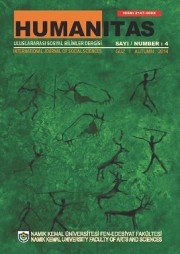ÜNİVERSİTE ÖĞRENCİLERİNİN TÜRKİYE’DE YAŞANAN ASKERİ DARBELERE İLİŞKİN ALGILARI ÜZERİNE BİR İNCELEME
AN INVESTIGATION OF UNIVERSITY STUDENTS’ PERCEPTIONS ON TURKISH MILITARY COUPS
Author(s): Author Not SpecifiedSubject(s): Social Sciences
Published by: Namık Kemal Üniversitesi Fen-Edebiyat Fakültesi
Keywords: Military Coup; Memorandum; Military Perception; Turkish Democracy, University Student
Summary/Abstract: Although military coups have long been an important issue of Turkish democracy, the number of empirical studies investigating perceptions and opinions of different groups on this topic is relatively small. The purpose of this study is to investigate the perceptions and ideas of university students with respect to the effects and consequences of military coups. Research participants were 197 undergraduate students, of which 127 females and 70 males, studying at two state universities in Turkey. The sample of the study was selected according to cluster sampling method. The browse model, which is one of the methods of quantitative data, was used in the study. For descriptive analysis, frequency, percentage and mean scores were used. In order to determine significance, Pearson’s Chi-square significance test was applied. A oneway ANOVA and Fischer’s LSD test were implemented for university, branch, and gender variables. We found that the majority of the participants have negative perceptions with respect to the effects and consequences of military coups. The highest agreement was found on the items measuring the psychological disruptions and negative impact of military coups on economy, whereas the lowest agreement was found on the items that military coups reinstate national unity and integrity and bring back a freedom atmosphere. We found significant differences on seven items with respect to gender variable. It is interesting however that male participants indicated higher negative views than females towards military coups. The lowest significance difference was found on the political view and political identification variables. In the conclusion part, some limitations of the study were discussed, and the findings of the study were evaluated by relating its results to some other studies.
Journal: Humanitas - Uluslararası Sosyal Bilimler Dergisi
- Issue Year: 2/2014
- Issue No: 04
- Page Range: 259-278
- Page Count: 19
- Language: Turkish

